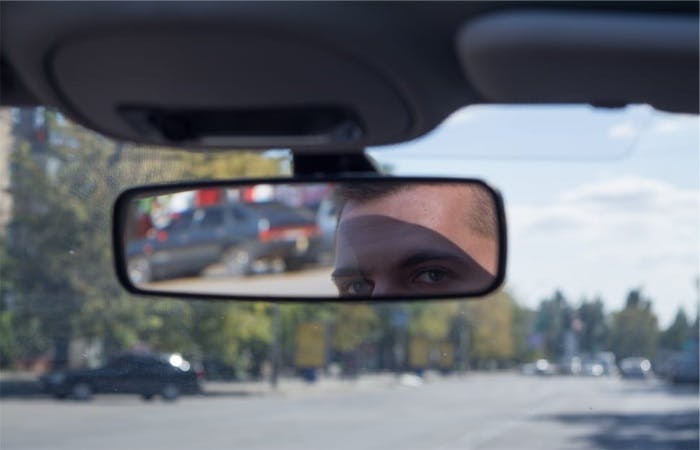
There are strict eyesight rules that all drivers are required to follow. But how does sight in only one eye—monocular vision—affect your legality and ability to drive? You may experience loss of sight in one eye before you ever start thinking about learning to drive, or develop the problem after you've passed your test and had your licence for years.
Either way, you need to know what the DVLA has to say on the matter, whether you need to inform your insurance company, and the resources available for helping you adapt to driving with one eye.
The rules about driving with eyesight in one eye
Applying for your licence
The following information relates to car drivers only. If you’re looking to apply for a bus, coach or lorry licence, you will need to inform the DVLA if you have monocular vision.
Whether or not you’ll be allowed to drive with eyesight in just one eye is a matter of your individual circumstances. However, chances are that you will be able to get behind the wheel—and, according to current official guidelines, applicants for car or motorbike licences will not usually even have to tell the DVLA about your condition.
So long as you meet the usual eyesight standards for driving, it doesn’t matter if you have sight in one eye or both.
In a nutshell, you must be able to:
- Read a post-2001 number plate from 20 metres away, and
- Have an adequate field of vision.
However, if you have no vision in one eye, your visual field in your other eye must be unimpaired. Your optician will be able to assess this for you, and advise you further on whether you’re legally fit to drive.
If you have a condition in your remaining eye, or the eye with sight, check whether it’s on the list of medical conditions about which you are required to tell the DVLA. If it is, you will be asked to provide the DVLA with further details and evidence relating to your eyesight, and may have to undergo further DVLA-approved eyesight tests before being allowed to drive.
Change in vision
If you lose sight in one eye when you are already a fully qualified driver, check whether you can still meet the eyesight standards for driving. If you can’t, you need to tell the DVLA about the change in your vision.
If you fail to do so when required, you can be fined and your licence revoked.
Temporarily
You may have a condition that requires a patch over one eye as a temporary measure, or may experience transient monocular vision loss. You should be advised by your doctor about whether you are able to drive during this time. It is generally thought to take about 3 months to become properly accustomed to monocular vision, so you may have to find alternative forms of transport for a short time.
How can monocular vision affect your driving?

Your field of vision will be reduced if you can only see out of one eye, meaning you might miss hazards on the road that you may otherwise have seen. You will also experience a blind spot where your nose blocks your view.
Depth perception, which helps you to judge distances, can also be affected. This can make skills like getting onto motorways from slip roads and travelling in traffic particularly difficult. However, most people are able to adapt well to living with sight in one eye, even if they develop the condition later in life.
While sight in one eye can reduce your overall peripheral vision, it doesn’t halve it. You will have to turn your head more to compensate for your narrower field of vision and blind spots, but this should become habitual over time. And while you may initially experience issues with your depth perception, it’s amazing how the human brain can adjust.
Good news, then: as a condition on its own, monocular vision shouldn’t stop you having the freedom to get out and about in car.
Learning to drive with one eye
If you have sight in one eye only, and are thinking about learning to drive, then the first thing to do is to check that you are legally permitted to drive.
Next, look at whether you’ll need to inform the DVLA of your eyesight limitations. If you do, you should do this when you apply for your first provisional licence. Just be aware that it may take a little longer to receive your green card than the usual couple of weeks.
Once you’ve established that you’re allowed to drive, the process is just the same as any wannabe learner driver: establish whether you wish to gain a manual or automatic licence, find a competent driving instructor who is able to work to your timeline, practice outside of lessons (as long as you've got the right learner driver insurance), pass your theory and practical tests—then get on the roads!
Refresher lessons

If you have a driving licence, but have recently lost vision in one eye, you may still be allowed to drive legally.
However, adjusting to driving with one eye can take time—and might be a tad nerve-wracking. If you’ve been told that you’re allowed to drive, but are you’re struggling to adapt, then one option is to opt for some refresher lessons. These give you chance to go out with a professional driving instructor and build up your confidence, so that you’ll get back to feeling comfortable solo driving again. Driving instructors often have pupils who have already passed their practical tests, and may well have experience in teaching others with similar eyesight issues.
Remember, you can always talk to them about their teaching style and explain your particular needs and requirements before you commit to any lessons.
Insurance rules
While you are not usually obliged to tell the DVLA that you don’t have sight in one eye, car insurance companies may require you to tell them. If you withhold the information and make a claim at any point, your insurance may be deemed invalid. This can cause huge financial problems, so it’s always best to check with your individual insurer about the specific conditions of your policy.
What to do if you’re concerned about your eyesight
If you notice any deterioration in your eyesight (perhaps driving in the dark or reading captions on TV is becoming more difficult, or you’re experiencing headaches, blurriness or dark patches), always seek medical advice. Get booked into your local trusted optician; if nothing else, at least you'll have checked that you're fit and legal to drive.
Subscribe for driving advice, offers & more
We'd love to let you know about our courses, news and offers via email. You may unsubscribe at any time.
Star Genie Limited trading as PassMeFast. Company number 10093359
Copyright © 2024 owned by Star Genie Limited
PassMeFast, Blue Tower, MediaCityUK, Salford, M50 2ST
